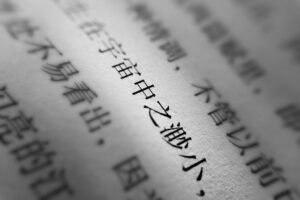In Chinese, the particle “们 men” denotes the plural of humans or any other type of life.
Table of Contents
ToggleThe plural suffix “们 men” can be used after human nouns to give them a definite reference.
同学 tóngxué(classmate)
同学们 tóngxuémen(classmates)
同事 tóngshì(colleague)
同事们 tóngshìmen(colleagues)
老师lǎoshī (teacher)
老师们lǎoshīmen (teachers)

Adding “们 men” to the end of a word is often done when talking to a group of people and usually shows familiarity:
嘿,姐妹们!
Hēi, jiĕmèi men!
Hey, girls!
嘿, 朋友们!
Hēi, péngyǒumen!
Hey, friends!
孩子们,早上好。
Háizimen, zǎoshang hǎo.
Good morning, children.
同事们,我回来了!
Tóngshìmen, wǒ huíláile!
Colleagues, I’m back!
But you can’t use a number with “们 men”:
三个朋友 sān gè péngyǒu (three friends)
Wrong: *三个朋友们 sān gè péngyǒumen(three friends)
十个学生shí gè xuéshēng (ten students)
Wrong: *十个学生们shí gè xuéshēngmen (ten students)
“们 men” can not be used as a plural suffix for non-human nouns:
Wrong: *苹果们 píngguǒmen (apples)
Wrong: *鞋子们 xiézimen (shoes)
Wrong: *手机们shǒujīmen (mobile phones)
Wrong: *鲜花们xiānhuāmen (the flowers)
Wrong: *电脑们diànnǎomen (computers)
Visitors to mainland China won’t have to go through quarantine when they get there after January 8. If you want to do an internship somewhere exciting and different, China might be the place for you. Learn more about our Internship Program in China!







